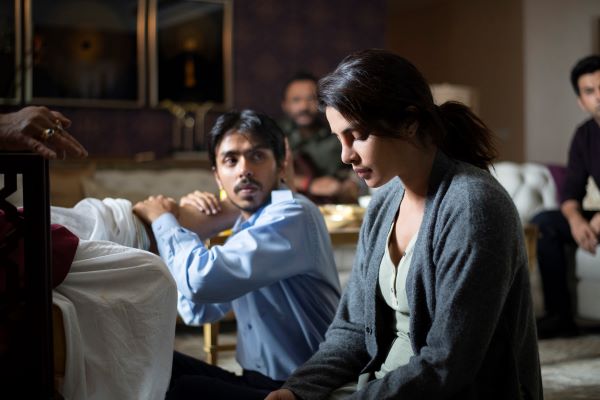
You don’t need to look far these days for conversations about the wealth gap. The pandemic has made us keenly aware of systemic inequality, and in recent years, filmmakers have been eager to embrace it as a subject. As with any trendy topic, we are likely to see it both in brilliant treatments (Parasite) and others that might be entertaining but a little facile (Knives Out).
Ramin Bahrani’s The White Tiger has roots not in the current discourse but in Aravind Adiga’s 2008 novel, which won the Man Booker Prize and has been recommended to me many times. Bahrani’s film proves that I really do need to read it. Like Parasite, The White Tiger creates a nuanced, lacerating portrait of the ugliness of the class system with vigorous energy and admirable scope, which is all the more impressive considering that the entire movie is from the perspective of one person.
We first meet Balram Halwai (Adarsh Gourav), a young Indian entrepreneur, as he composes an email to Wen Jibao (China’s premier at the time) in hopes of securing a meeting with him. In doing so, he spills out his life story, which in turn plays out before us. He begins life poor in the town of Laxmangarh. When his father is unable to pay the landlord, Balram is forced out of school and into the workforce. His father then dies young of tuberculosis, and Balram is left with his grandmother to answer to. The bulk of the story line, however, concerns his attempt to rise in the world by becoming a driver and servant to the family of the landlord his father failed to pay. What follows is painful and brutal, but not without its rewards for our protagonist.
The film moves to the sound of Balram’s voice, which usually provides straightforward narration, alternately sardonic and sincere. However, it is much more present than the average voiceover. I initially resisted it, as Balram’s voice so quickly spins sequences into and out of being and, at first, there is rarely a scene that is allowed to speak for itself without commentary, yet that it is part of the film’s appeal. It does not give us much time to rest. Instead, it asks us to keep apace. The images too— of extreme poverty, busy highways, and the pristine homes of the rich—are often crowded. The White Tiger encompasses the contradictory realities of modern India, and thus is well served by Balram’s narration and the quick, overstimulating procession of its images.
Most notable is the relationship between Balram and his employer’s son, Ashok (Rajkummar Rao), and daughter-in-law Pinkie (Priyanka Chopra Jonas). It perhaps goes without saying that, at their hands, Balram suffers numerous indignities and endures them, mostly with a smile, often telling them they are like a mother and father to him. What is much more disquieting is that Ashok and Pinky appear very uncomfortable in the master/servant relationship and yet are unable to let go of it.
Pinky spent most of her childhood in America, and Ashok spent his college years there. Consequently, they insist that Balram call them by their first name, choose random moments to tell him he must finish his education, and act like they are best friends with him. Still, they lash out at him and, in crucial moments, reveal themselves to be much more concerned with their own well-being than his. In short, they are nuanced, therefore much more cutting.
What emerges is a strong film about the amorality that is required to succeed in an amoral world. Though I think there is much to praise about its fast pace, one senses many events were condensed and given fuller treatment in the novel. Nevertheless, it is hard to resist, even if we might be chilled by where it takes us.
















Leave A Comment